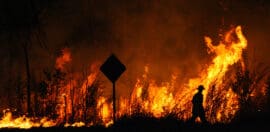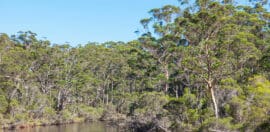An Australia of two stories

15 March 2023 at 3:02 pm
There is a fundamental contrast, reflects Greenpeace CEO David Ritter, between the attitudes and choices of those who profit from accelerating climate destruction and those who are dealing with the consequences.
I was at a school parents and citizens meeting earlier this week, when someone interrupted a discussion about student performances to ask a question about temperatures inside the school hall.
“Summers are getting hotter,” the woman noted, “and we need our kids to be safe, and able to learn”. Others nodded in agreement. Just another everyday reminder that the damage caused by climate change in all its various forms is now our shared experience.
Climate impacts are happening to us in big and small ways. There are the moments of sudden catastrophe – the fires and floods that have swept up hills and down valleys, consuming whole towns. And then there’s the forms of slower and subtler violence, like the accumulated weariness from incessant heat; the creeping black damp and mould in the wake of the rains; and the debilitating periods of disaster “recovery” for communities that are extending for months and years after the initial impact of an extreme weather event has passed.
Historically, “natural disasters” were unusual things that occurred more-or-less unexpectedly. No longer. Australia has already heated up by 1.47 degrees on a pre-industrial baseline. Once very rare natural disasters are occurring with increasing regularity and severity. Now, to quote a recent cover of The Monthly, we live in times characterised by “Twice in 100 Years since February”.
The plain truth is that Australians – in common with all the people of the world – are facing generalised conditions of life that are significantly harsher.
The extraction and burning of coal, oil and gas is the primary driver of global warming. It is the decisions of the senior executives of the fossil fuel corporations that are making life more rapidly more dangerous, unpredictable and unpleasant for humanity.
There’s a fundamental contrast at work here – between the attitudes and choices of the bosses at the coal, oil and gas companies, and those of the people whom they are harming through their actions.
The executives at the massive fossil fuel corporations – Woodside, Chevron, Shell, Santos and the rest – are driven by amoral greed: determination to continue to maximise profits from a sector that is premised on activities leading to wholesale death and destruction.
Woodside, for example, is proposing to push ahead with the Burrup Hub – the most climate polluting project under consideration for development anywhere in Australia. The Burrup Hub is ecocidal in scope – but holds out rich promise for those who would profit from chaos and suffering.
On the other hand, the response of those who are facing the consequences of those decisions – from the worried parent who wonders whether her child will be safe from extreme heat in school, to those who have lived through the direct experience of the fires and floods – is generally about love and care.
Take for example, the stories that are told in Heart of the Storm, a six-part podcast narrating the experience of one rural community in NSW that experienced the great fires of the 2019-2020 Australian summer. As Rose Ricketson, one of the producers of the doco, told the ABC, what got her through the experience of disaster “was seeing the kindness in each other”. The motivation for creating the series was an other-regarding desire to give back to the community.
A couple of years ago I had the opportunity to talk with Clare Young who is the other co-producer of Heart of the Storm. “The flipside of disaster,” Clare told me then, “is the uprising of humanity.”
Much more recently, I spent three days visiting flood-damaged towns in the Northern Rivers region of New South Wales at the invitation of friends and colleagues based in the area. One of my generous guides and companions for the trip was Northern Rivers Community Foundation CEO Sam Henderson who has written a short account of our testimony-gathering itinerary here.
I am very deeply grateful for the raw honesty with which people shared the experiences of how lives, plans, homes and landscapes had been impacted by the floods and their aftermath.
One of the things that came through most strongly across these conversations, was the sense in which people were other-regarding; and that it was community and a sense of the collective good that had prevented an even worse disaster unfolding. From the legend of the “tinny army” of small craft that is credited with saving so many lives, to the strangers who turned up with mops and buckets, neighbours who continue to look out for one another as the “recovery” drags on, and the dedication of community workers and volunteers, we heard numerous stories of deepest care and kindness.
The disparity with the impulses of the Woodside executives and the top brass at the rest of the fossil fuel polluters could hardly be greater.
Truly, we live in an Australia of two stories: the selfish amorality of those who profit from accelerating climate suffering and destruction; contrasted with the instinctive decency and heroism of those who are dealing with the consequences.








Thank you for pba over the years. I read them pretty regularly and don’t find the same information elsewhere